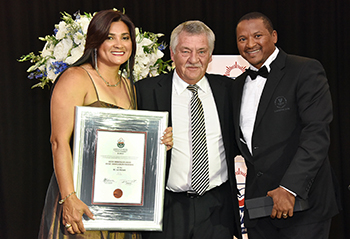Latest News Archive
Please select Category, Year, and then Month to display items
13 January 2020
|
Story Eugene Seegers
|
Photo Anja Aucamp
 Spearheading the digital expansion of the conversational Sesotho course is IDEAS Lab Director, Johann Möller (middle). With him are from the left: Prof Pule Phindane, CUT; Dr Brenton Fredericks, CUT; Bahedile Letlala, UFS Department of African Languages; and Dr Elias Malete, UFS Department of African Languages.
Spearheading the digital expansion of the conversational Sesotho course is IDEAS Lab Director, Johann Möller (middle). With him are from the left: Prof Pule Phindane, CUT; Dr Brenton Fredericks, CUT; Bahedile Letlala, UFS Department of African Languages; and Dr Elias Malete, UFS Department of African Languages.
For many years now, the UFS has been offering a one-year course in conversational Sesotho for staff members; this can then be followed up with the one-year course in advanced conversational Sesotho. The conversational Sesotho for students in the Faculty of Education was introduced in 2018 at the UFS.
The Central University of Technology (CUT) needed a conversational course for its first-year students and approached the Department of African Languages for the development of such a course. Living as we do in a multilingual country; this additional language skill opens doors and often hearts as well.
Using instructional design principles
However, the need was identified by both CUT and UFS to present this crucial information in a way that would be more appealing to digital natives as well as to those less familiar with technology. The Department of African Languages on the UFS Bloemfontein Campus, together with relevant departments from the CUT, approached the IDEAS Lab located on the UFS South Campus, since they already have a reputation for being a specialist on broadcasting and repackaging curricular content for digital presentations. The IDEAS Lab provided technical advice and built the multimedia programme, which will help the user to hear and practice phrases in Sesotho, using instructional design principles. The course will be available to both staff and students belonging to the two universities.
Room for growth
Johann Möller, Director of the IDEAS Lab, says this pilot programme will give both institutions the opportunity to test the use of multimedia for language acquisition. He adds, “Language is extremely complex, and we would like to expand this learning aid in the future.” In fact, the original design has room for growth built into it.
To keep things simple for the user and the building team, it was decided to start out with only four potential everyday scenarios where a staff member would like to speak Sesotho: Firstly, how to greet other persons from different genders; secondly, potential scenarios one might encounter in the university environment itself; thirdly, how to deal with situations at a hospital; and finally, how to use one’s language skills at a filling station.
Pronunciation is key
Each scenario contains three to four conversations that the learner can revise, along with images and audio that illustrate the situation and assist with correct pronunciation. The system does not allow the user to progress unless they have listened to the pronunciations of the sample sentences or phrases.
Further reading material and vocabulary lists are also provided, with the result that people who are using the programme can learn at their own pace. The authoring software Articulate Storyline was used to build the individual scenarios and each conversation or lesson within it. The lessons are also not dependent on an internet connection; they can be downloaded onto a flash memory drive and used offline.
Call for nominations for the Chancellor’s Distinguished Alumni Awards
2017-06-23

The University of the Free State has produced a crop of excellent alumni who have placed the university on the world stage. The aim of the third annual Chancellor’s Distinguished Alumni Awards is to acknowledge and honour alumni for achievements in both their personal capacity and occupational fields. Recognition for the 2017 Chancellor’s Distinguished Alumni Awards will be based on achievements attained from 2016 to 2017.
Nominations are invited in five categories:
• The Chancellor’s Distinguished Alumnus of the Year Award, the highest honour accorded to an alumnus, recognises the distinguished national or international achievements of its recipient.
• The Young Alumnus of the Year Award acknowledges the achievements of alumni who have graduated within the past decade.
• The Cum Laude Award is bestowed upon an alumnus to recognise excellence in any field.
• The Executive Management Award is made to any person (not necessarily an alumnus) who has delivered exceptional service to the university.
• The Kovsie Ambassador Award is bestowed upon a current student whose achievements have brought distinction to him/her, benefited his/her community, and brought credit to the University of the Free State.
Previous recipients of the Chancellor’s Distinguished Alumni Awards include television personality, Leon Schuster; Free State Education MEC, Tate Makgoe; politician, Adv. Roelf Meyer; Olympic gold medallist, Wayde van Niekerk; former Miss World, Rolene Strauss; CEO of Central Media Group, Gary Stroebel; and Judge President of the Free State High Court, Justice Mahube Molemela.
Nominations can be submitted in writing to the Alumni Office at alumni@ufs.ac.za using the provided nomination form. A selection panel will choose the appropriate candidate(s) with age, race, and gender playing no role in the selection process. The closing date for submission of nominations is 12:00 on 31 July 2017. Award winners will be announced at a gala banquet on Saturday, 26 August 2017.
Additional queries can be directed to Helen Namponya at +27 51 401 9343, or by email at alumni@ufs.ac.za.